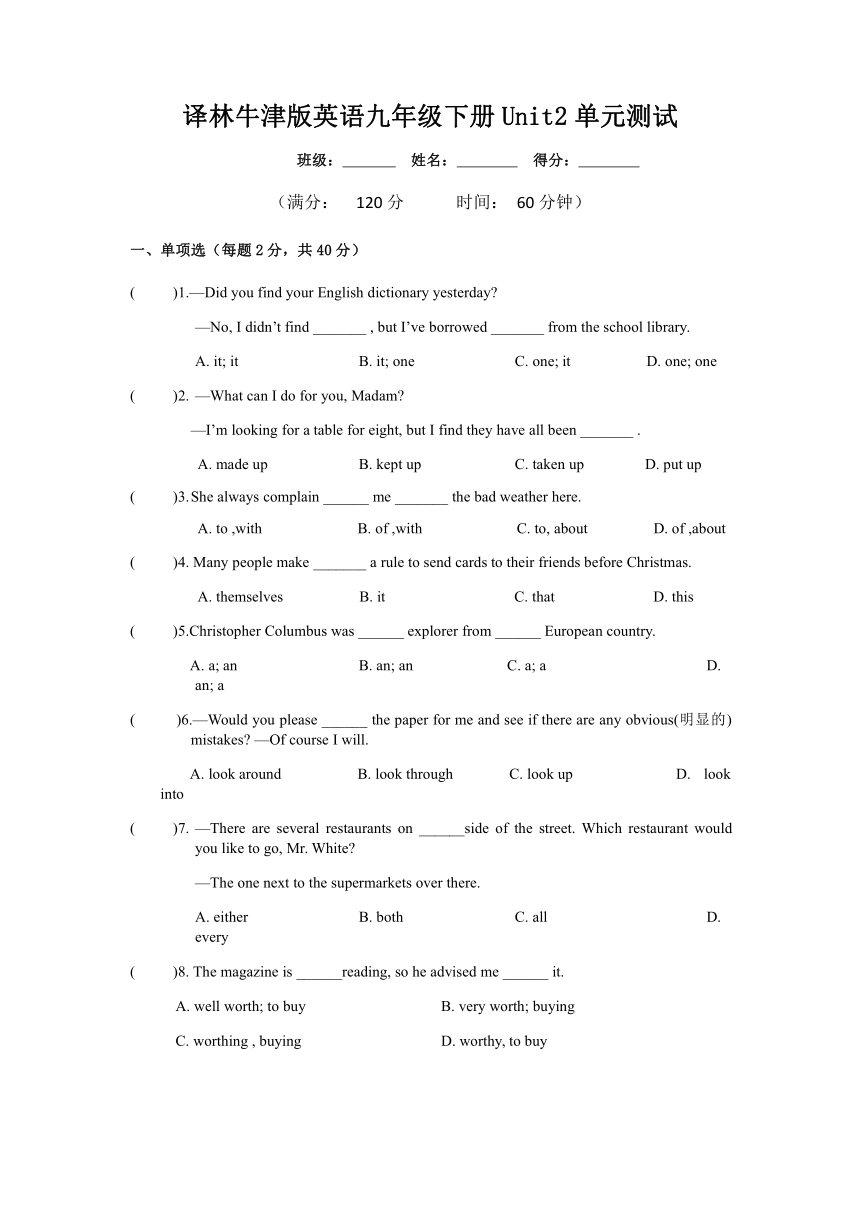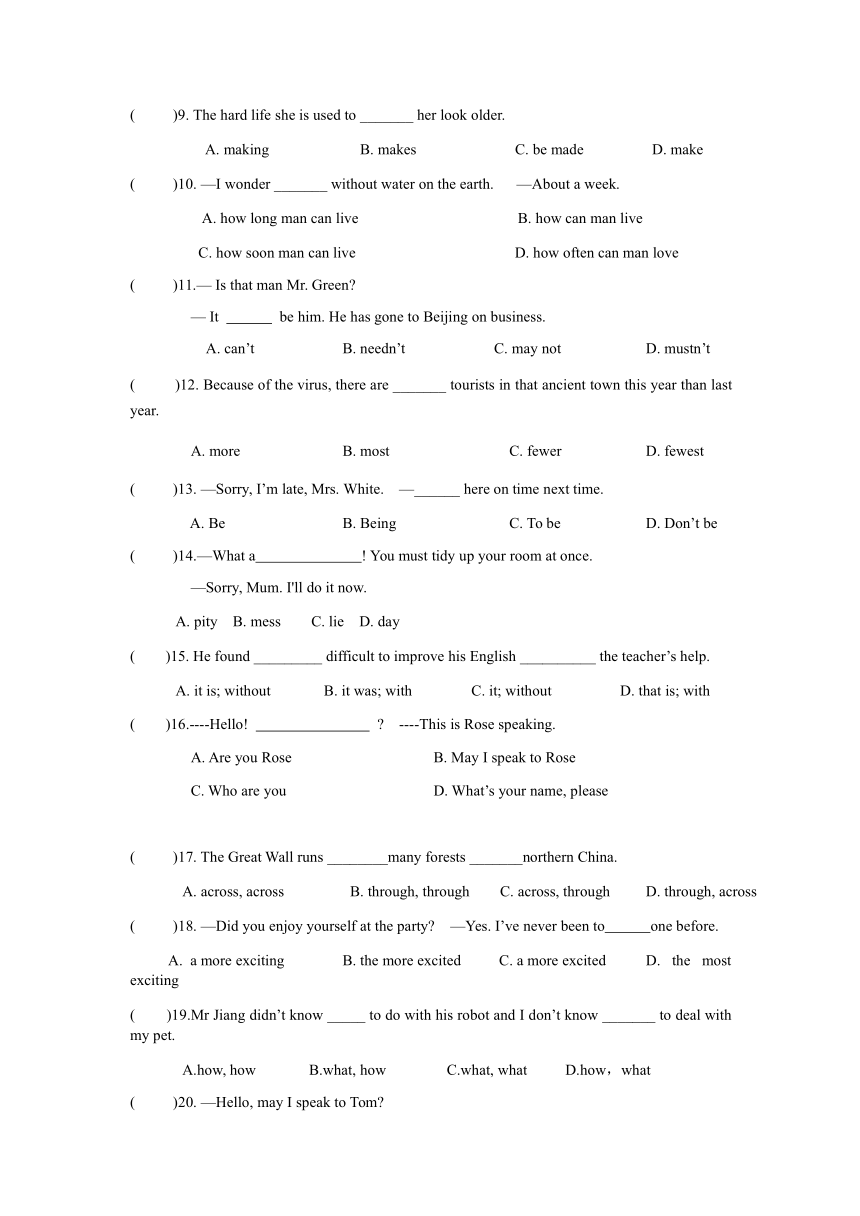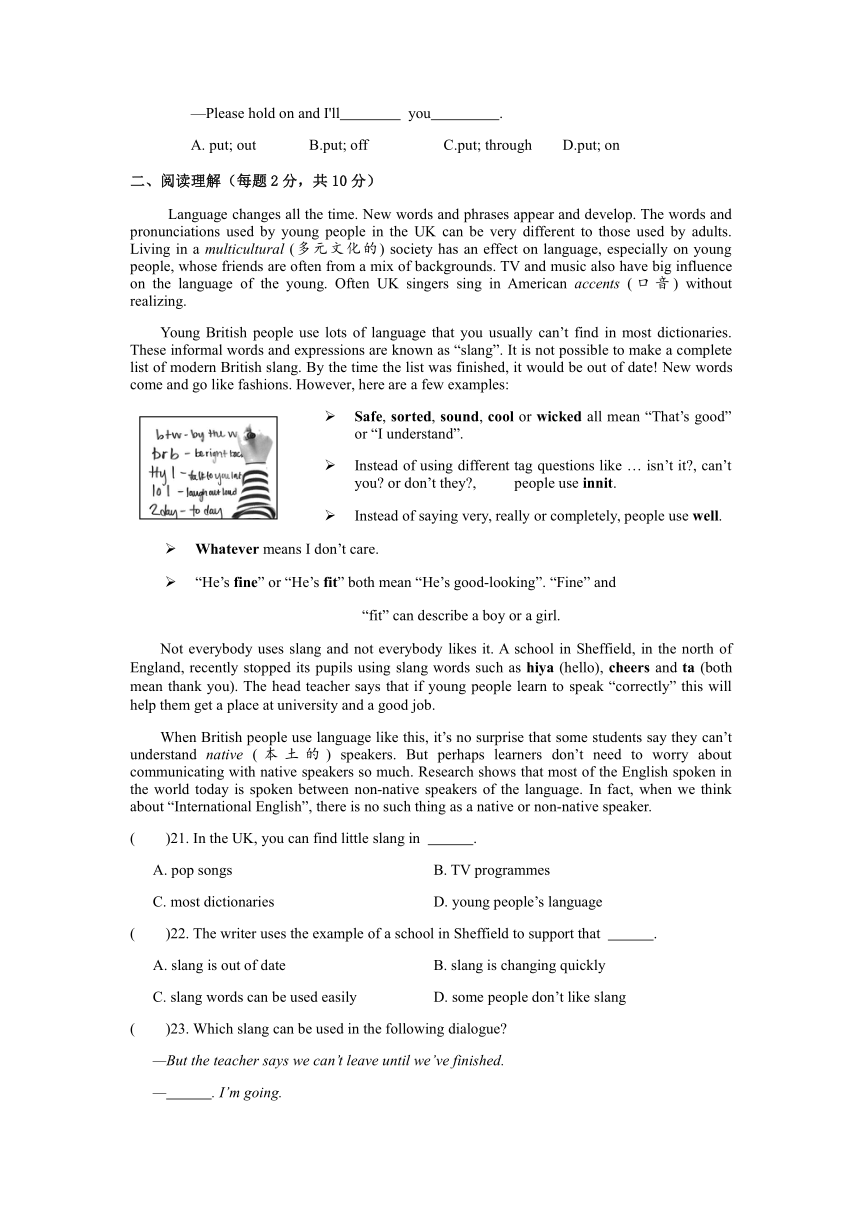译林牛津版英语九年级下册Unit 2 Great people单元测试(含答案)
文档属性
| 名称 | 译林牛津版英语九年级下册Unit 2 Great people单元测试(含答案) |  | |
| 格式 | zip | ||
| 文件大小 | 118.0KB | ||
| 资源类型 | 教案 | ||
| 版本资源 | 牛津译林版 | ||
| 科目 | 英语 | ||
| 更新时间 | 2020-03-12 14:20:26 | ||
图片预览



文档简介
译林牛津版英语九年级下册Unit2单元测试
班级: 姓名: 得分:
(满分: 120分 时间: 60分钟)
一、单项选(每题2分,共40分)
( )1.—Did you find your English dictionary yesterday?
—No, I didn’t find _______ , but I’ve borrowed _______ from the school library.
A. it; it B. it; one C. one; it D. one; one
( )2. —What can I do for you, Madam?
—I’m looking for a table for eight, but I find they have all been _______ .
A. made up B. kept up C. taken up D. put up
( )3. She always complain ______ me _______ the bad weather here.
A. to ,with B. of ,with C. to, about D. of ,about
( )4. Many people make _______ a rule to send cards to their friends before Christmas.
A. themselves B. it C. that D. this
( )5.Christopher Columbus was ______ explorer from ______ European country.
A. a; an B. an; an C. a; a D. an; a
( )6.—Would you please ______ the paper for me and see if there are any obvious(明显的) mistakes? —Of course I will.
A. look around B. look through C. look up D. look into
( )7. —There are several restaurants on ______side of the street. Which restaurant would you like to go, Mr. White?
—The one next to the supermarkets over there.
A. either B. both C. all D. every
( )8. The magazine is ______reading, so he advised me ______ it.
A. well worth; to buy B. very worth; buying
C. worthing , buying D. worthy, to buy
( )9. The hard life she is used to _______ her look older.
A. making B. makes C. be made D. make
( )10. —I wonder _______ without water on the earth. —About a week.
A. how long man can live B. how can man live
C. how soon man can live D. how often can man love
( )11.— Is that man Mr. Green?
— It be him. He has gone to Beijing on business.
A. can’t B. needn’t C. may not D. mustn’t
( )12. Because of the virus, there are _______ tourists in that ancient town this year than last year.
A. more B. most C. fewer D. fewest
( )13. —Sorry, I’m late, Mrs. White. —______ here on time next time.
A. Be B. Being C. To be D. Don’t be
( )14.—What a ! You must tidy up your room at once.
—Sorry, Mum. I'll do it now.
A. pity B. mess C. lie D. day
( )15. He found _________ difficult to improve his English __________ the teacher’s help.
A. it is; without B. it was; with C. it; without D. that is; with
( )16.----Hello! ? ----This is Rose speaking.
A. Are you Rose B. May I speak to Rose
C. Who are you D. What’s your name, please
( )17. The Great Wall runs ________many forests _______northern China.
A. across, across B. through, through C. across, through D. through, across
( )18. —Did you enjoy yourself at the party? —Yes. I’ve never been to one before.
A. a more exciting B. the more excited C. a more excited D. the most exciting
( )19.Mr Jiang didn’t know _____ to do with his robot and I don’t know _______ to deal with my pet.
A.how, how B.what, how C.what, what D.how,what
( )20. —Hello, may I speak to Tom?
—Please hold on and I'll you .
A. put; out B.put; off C.put; through D.put; on
二、阅读理解(每题2分,共10分)
Language changes all the time. New words and phrases appear and develop. The words and pronunciations used by young people in the UK can be very different to those used by adults. Living in a multicultural (多元文化的) society has an effect on language, especially on young people, whose friends are often from a mix of backgrounds. TV and music also have big influence on the language of the young. Often UK singers sing in American accents (口音) without realizing.
Young British people use lots of language that you usually can’t find in most dictionaries. These informal words and expressions are known as “slang”. It is not possible to make a complete list of modern British slang. By the time the list was finished, it would be out of date! New words come and go like fashions. However, here are a few examples:
? Safe, sorted, sound, cool or wicked all mean “That’s good” or “I understand”.
? Instead of using different tag questions like … isn’t it?, can’t you? or don’t they?, people use innit.
? Instead of saying very, really or completely, people use well.
? Whatever means I don’t care.
? “He’s fine” or “He’s fit” both mean “He’s good-looking”. “Fine” and
“fit” can describe a boy or a girl.
Not everybody uses slang and not everybody likes it. A school in Sheffield, in the north of England, recently stopped its pupils using slang words such as hiya (hello), cheers and ta (both mean thank you). The head teacher says that if young people learn to speak “correctly” this will help them get a place at university and a good job.
When British people use language like this, it’s no surprise that some students say they can’t understand native (本土的) speakers. But perhaps learners don’t need to worry about communicating with native speakers so much. Research shows that most of the English spoken in the world today is spoken between non-native speakers of the language. In fact, when we think about “International English”, there is no such thing as a native or non-native speaker.
( )21. In the UK, you can find little slang in .
A. pop songs B. TV programmes
C. most dictionaries D. young people’s language
( )22. The writer uses the example of a school in Sheffield to support that .
A. slang is out of date B. slang is changing quickly
C. slang words can be used easily D. some people don’t like slang
( )23. Which slang can be used in the following dialogue?
—But the teacher says we can’t leave until we’ve finished.
— . I’m going.
A. Sound B. Fine C. Cheers D. Whatever
( )24. If you want to learn more about the subject of the passage, you can search the Internet with the key words “ ”.
A. English slang B. British people C. language changes D. English cultures
( )25. This passage would most likely be found in a book of .
A. novel B. culture C. travel D. history
三、任务型阅读(每题2分,共20分)
What are mistakes? In my ideas, they are great teachers! Success comes to those who are willing to risk making mistakes to achieve their goals and wishes, and who are able to learn from those mistakes. And in order to learn from mistakes, you must be willing to pay for them.
Mistakes can be very valuable(有价值的), but when you try to get others to pay for your mistakes, then you lose the chance to learn from them. When something goes wrong, it’s usually very easy to find someone else’s mistakes, but is that useful?
Much of the value of mistakes comes from the fact that they need a cost that must be paid. The person who learns the most from a mistake is the one who pays the price for that mistake.
When you made a mistake, what you shouldn’t do is run away from it. You need to accept it. Pay the price, learn the lesson, and grow that much stronger.
When you make a mistake, don’t look back at it long. Remember the reason for it, and then look forward. Mistakes are lessons of wisdom. The past cannot be changed. The present is still in your power. Make full use of your mistakes so that you can achieve your goals and wishes.
Mistakes are great (26)
Who can be (27) ※People who not only achieve their goals and wishes at the risk of (28) mistakes but also learn from and pay for them.
When you make mistakes ※Don’t (29) away from them. It’s easy but (30) to find someone else’s mistakes.
The (31)of mistakes ※You can learn a lot from mistakes and grow stronger by (32) the price for them.
Advice ※When you make mistakes, remember (33) you make them and then look forward because you can’t change the (34).※The present is still in your power, so make full use of them in (35) to achieve your goals and wishes.
26.__________27. __________28. __________29. __________ 30. __________
31. _________ 32. __________33. __________34. __________35. __________
四、词汇题(每题2分,共30分)
36. In the factory, Mr. Li is talking while _____________ (指着) at the map.
37 She became a famous actress in her (forty).
38. He’ll have his watch (repair) tomorrow.
39.What’s the (形状) of that cake? Is it round?
40. Her hair is long and (垂下) down to her waist.
41. More and more people are (反对) smoking in public because of the second-hand smoke.
42. The (夫妇)who live in this house have lived here for 40 years.
43. To my (诧异),I woke up on the floor the next morning. I didn’t know why.
44. Nelson Mandela was a ____________ (战斗者) for the rights of black Africans all his life.
45.When I came in, I saw him (lie) in bed.
46.The Great Wall is one of the (wonder) in the world.
47. Last year, I took my first direct _______________ (fly) from Shanghai to London.
48. It is very ___________ (tire) to climb the Great Wall step by step.
49. Qian Xuesen is the __________ (proud) of our country.
50. Take down the two __________ (invent) names so that we can get touch with them as soon as possible.
五、书面表达(20分)
要点:
1. 颐和园是一座中国园林,主要包含一座小山和一片湖。
2. 湖非常大——它占了整个区域的四分之三。我们可以在上面划船,非常惬意。
3. 横跨湖面的是十七孔桥。桥的两侧有很多石狮子,他们形态各异。
4. 我认为颐和园非常值得一去。
译林牛津版英语九年级下册Unit2单元测试答案
一、单项选(每题2分,共40分)
1-5 BCCBD 6-10 BAABA 11-15 ACABC 16-20 BDABC
二、阅读理解(每题2分,共10分)
21-25 CDDBB
三、任务型阅读(每题2分,共20分)
26. teachers 27. successful 28. making 29. run 30. useless
31. value 32. paying 33. why 34. past 10. order
四、词汇题(每题2分,共30分)
36. pointing 37. forties 38. repaired 39. shape 40. reaches
41. against 42. couple 43. surprise 44. fighter 45. lying
46. wonders 47. flight 48. tiring 49. pride 50. inventors’
五、书面表达(20分)
略。
